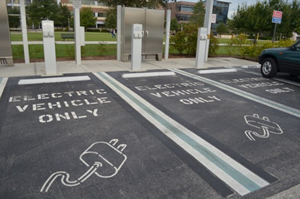By Sherri Shields
COCOA, October 24, 2013 – As interest in electric vehicles continues to keep the automotive industry charged, the nation is strategizing how to best integrate plug-in vehicles with its electrical grid and highways. Now, with funding from the U.S. Department of Transportation for the creation of the first transportation center with a focus on electric vehicles, the University of Central Florida will help chart that course in Florida.

The Electric Vehicle Transportation Center operated by UCF’s Florida Solar Energy Center is a newly funded, four-year, $9 million research effort to help create the nation’s electric-vehicle transportation network. Research conducted by the center will help transportation planners prepare our nation’s highways for the influx of plug-in electric vehicles (PEV), while developing “smart grid” applications that will strengthen the ability of our electric system to accommodate the power demands of electric vehicles. PEVs need a reliable, predictable network of charging stations to allow them to travel long distances without the fear of “running out of fuel.” Workplace charging, community charging, and highway fast-charging systems are in development. A new PEV transportation network designed in conjunction with the modernization of our electric grid system will result in a sustainable highway and energy network.
“Today, electric vehicles—using Florida utility power—operate at an equivalent gasoline price of 99 cents a gallon,” said FSEC director James Fenton. “With fuel costs that low, it’s no surprise projections indicate that Florida will have as many as 500,000 electric vehicles on its roads within 10 years, placing an unprecedented demand on today’s utility grid.”
Plug-in electric vehicle sales in the U.S., led by the Volt, Leaf and plug-in Prius, were 50,000 in 2012. The upward trend in sales is expected to continue during the next several years as automakers introduce up to 40 different plug-in models.
Transformation of the U.S transportation system into one that uses electricity and its integration into a dynamic electrical grid will occur over many years and require extensive research and development.
The new Electric Vehicle Transportation Center will leverage the resources of the University of Central Florida and its partner universities – the University of Hawaii and Tuskegee University – to conduct the research and development, and to train and support the scientists, engineers and technicians of the future.
The University of Central Florida’s EVTC is among 33 universities funded to address critical transportation challenges facing the nation. To view a map of the selected universities, go to: http://www.rita.dot.gov/utc/sites/rita.dot.gov.utc/files
/Consortiums_2014.pdf
For more information, contact the EVTC program director David Block at block@fsec.ucf.edu or 321-638-1001.
About FSEC: The Florida Solar Energy Center, a research institute of the University of Central Florida, is the largest and most active state-supported energy research institute in the nation. Current divisions and their research activities include Advanced Energy Research: alternative transportation fuels, batteries, hydrogen fuel and fuel cells; Buildings Research: energy-efficient buildings; and Solar Energy: solar water and pool heating, and photovoltaic (solar electric) systems. For more information about the center, visit http://www.floridaenergycenter.org or call the FSEC Public Affairs Office at 321-638-1015.
50 Years of Achievement: The University of Central Florida, the nation’s second-largest university with nearly 60,000 students, is celebrating its 50th anniversary in 2013. UCF has grown in size, quality, diversity and reputation, and today the university offers more than 200 degree programs at its main campus in Orlando and more than a dozen other locations. Known as America’s leading partnership university, UCF is an economic engine attracting and supporting industries vital to the region’s success now and into the future. For more information, visit http://today.ucf.edu.